
 Flash News
Flash News
EMRI/ Punched the secretary of the CEAZ in Kashar, the perpetrator of the violence is being escorted to the police station
Ornaldo Rakipi's observer punches the chairman of the KZAZ in Kashar
Document/ DP asks CEC for documentation of diaspora voting process
4 drug traffickers extradited from Greece and Italy, here are their sentences
125,278 envelopes from the diaspora are counted, what is the ranking among the competing parties?
Analysis: Absolute victory of the SP, fewer votes, more mandates
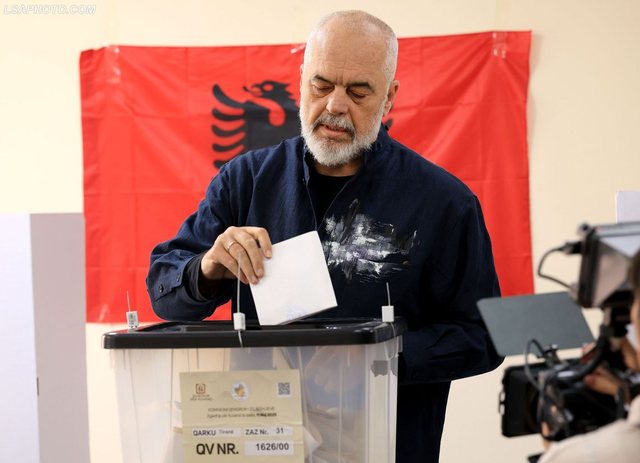
In a situation that appears to constitute a major distortion of the will of the voters, the Socialist Party of Albania is securing 83 parliamentary seats, while it received practically 52% of the votes. The 83 parliamentary seats constitute 59% of the parliament and the difference is caused by the systemic injustices installed by Rama and Berisha, initially in an agreement in 2008, an agreement confirmed last year.
According to the Constitution and democratic principles, parliamentary representation should reflect the popular will as closely as possible, although it is widely accepted that this is not possible 100 percent. Inequalities have been on a smaller scale during past elections, but they reached their peak in these elections, when various armies of Socialist Party patronages clashed with the opposition and each other to secure 733,000 votes domestically, 35,000 fewer than four years ago.
The total number of votes cast domestically on Sunday was 1.46 million, about 200 thousand fewer than four years ago. The Socialist Party fell by 35 thousand votes, while the 107 thousand votes that the Socialist Movement for Integration received four years ago are unknown where they ended up. Consequently, the 733 thousand votes that the SP has secured domestically have produced 83 mandates, with an average of 8834 votes per mandate. The Democratic Party coalition received 481 thousand votes and 50 mandates, for an average of 9635 votes per mandate. Tom Doshi's Social Democrats received 47 thousand votes and secured 3 mandates in total or one deputy mandate for every 16 thousand votes. The Albania Becomes Initiative received 49 thousand votes, but so far has secured only one mandate and has hopes for a second in Fier depending on the votes from emigration. Agron Shehaj's Mundesia Party secured two mandates with 43 thousand votes, with an average of over 21 thousand each. The Together Movement received 1 mandate with 20 thousand votes. The Euro-Atlantic Coalition received zero mandates with more than 19 thousand votes. In short, small parties needed two or three times as many votes per mandate as large parties.
“Substandard” choices
Albania has always been a country of concern regarding the way elections are organized and to date has not held a single election considered appropriate for a democratic country. But Sunday's elections received an unusually high level of criticism from international observers, who, in their preliminary report, spoke on eight occasions about practices or phenomena that were considered "inconsistent", "incompatible" or "contrary" to "international standards".
Shqetësimi kryesor i shprehur nga ndërkombëtarët lidhet me “rastet e frikësimit të mbështetësve të opozitës dhe keqpërdorimit të rrjeteve të patronazhimit.” Sipas raportit, këto probleme “u mbajtën shënim dhe janë të papërputhshme me standardet ndërkombëtare.”
Shqetësimi i dytë lidhet me informacionet që sugjerojnë se administrata publike i ka bërë presion votuesve të grupeve të margjinalizuara që të votojnë Partinë Socialiste. “Kjo është në kundërshti me standardet ndërkombëtare, të cilat kërkojnë që votuesit të jetë të lirë nga ndikimi apo shtrëngimi,” shkruhet në raport.
Shqetësimi tjetër lidhet me “përqendrimin e lartë të medias”, e cila nuk garanton dot larmishmëri të informimit, një kërkesë kyçe kjo për demokracinë dhe diçka që “është në kundërshti me standardet ndërkombëtare”.
Raporti vijon më tutje me kritikimin e vendimit të qeverisë për mbylljen e aksesit në Tiktok, vendim të cilin gjithashtu e veçon si i tillë që “bie ndesh me standardet ndërkombëtare”.
Ndërkombëtarët janë gjithashtu të shqetësuar për mungesën e mjeteve ligjore efikase për trajtimin e këtyre problemeve, nga fakti që Komisioni Qendror i Zgjedhjeve nuk ka arritur të kontrollojë dhe të dënojë abuzimet, te fakti që vendi nuk ka mekanizmat e duhur ligjorë për të garantuar larmishmërinë e skenës mediatike dhe luftën kundër oligopolit në tregun televiziv.
Se sa pasoja do të kenë këto shkelje të standardeve zgjedhore nga ana e Ramës për të, kjo është çështje e debatueshme. Fron Nahzi, studiuesi shqiptaro-amerikan që ka jetuar në vitet ’90 në Shqipëri dhe, në atë kohë, u shpall armik nga Berisha, shpjegon në një opinion për BIRN se, për shkak të gjendjes së përgjithshme botërore, diplomacia ka gjasa do të mbyllë sytë përballë kësaj rrëshqitjeje pas në standardet demokratike të vendit, ndërsa një prej vëzhguesve të OSBE-ODIHR, eurodeputeti Michael Gahler theksoi se “Shqipëria nuk mund të anëtarësohet në BE në gjendjen aktuale”.
Qarqe të varfra, fitore të mëdha
Pas zgjedhjeve të vitit 1991, kur Partia e Punës fitoi mbi 75% të parlamentit, shkrimtari shqiptar, Ismail Kadare deklaroi se kjo ishte “një fitore e mjerë”. Në atë kohë, shumica e zonave rurale të vendit, ku banonte 63% e popullsisë, votoi Partinë e Punës, ndërsa opozita siguroi sukses relativ në qendrat e mëdha urbane të vendit, përfshirë Tiranën. Komenti i Kadaresë për “fitore të mjerë” lidhej pikërisht me fitoren e siguruar mbi segmentet më të varfra të shoqërisë.
Zgjedhjet e së dielës shfaqin një panoramë të ngjashme, ku, pavarësisht makinerive të shumta elektorale, socialistët në Qarkun Tiranë arritën të fitojnë vetëm 48% të votave, nga 52% që fituan në rang kombëtar. Brenda Bashkisë Tiranë, në zonat rurale, si Baldushk, Ndroq, Pezë apo Petrelë, socialistët fituan 55 apo 60% të votave me një përjashtim të ish-Komunës Shëngjergj, që përfshin zonën malore përtej Malit të Dajtit, ku Socialdemokratët e Tom Doshit siguruan një rezultat surprizë prej 28%.
The situation is similar in other regions. The Fier region, where about 65% of the population lives in rural areas, is a valid example. The Socialists won 63% of the votes and 12 out of 16 mandates at the regional level, but in the city of Fier they won 58%, while in the surrounding rural areas the victories were much deeper. In Libofshë they won 70%, in Bubullimë 71%, etc.
In the city of Korça, the socialists received 52% of the vote, while in rural areas much more than that. The very deep and very poor mountainous area of Lekas scored a record 81%. The result at the district level, 54%.
In the Vlora region, the relatively wealthy tourist town of Himara gave the Socialists 43%, while the poor mountainous area of Horë-Vranisht gave them 78%.
In the Elbasan region, the Socialists won 60%, while in the city of Elbasan the result was 53% and in other areas, more than that. The former mountainous municipality of Zavalinë gave the Socialists almost 71% of the vote.
To see the rural-urban divide in the SP’s electoral success requires more analysis, but the trend is clear: electoral machinery functions more easily where the population is poorer. In this sense, Kadare’s comment about the Labor Party’s victory in 1991 likely applies to no small extent to Rama’s victory on Sunday.
The division of small parties
In past elections, the winning party has been favored by the seat-sharing formula by a maximum margin of 4.6%. This means that, in the 2017 elections, the Socialists managed to win 52.3% of the parliament with 48.3% of the vote, in Sunday's elections they are likely to win 83 seats or 59.3% of the vote, with a margin of 7 percentage points, the highest recorded in the last five elections.
The explanation for this disproportionate victory can be sought in the votes that did not produce mandates for small parties. In Berat, the Albania Becomes Initiative won 7.4% of the vote, while together with other small parties it received 12%. This is almost enough for one of the 7 mandates in the district, which was won by the SP 5 to 2.
In Fier, the socialists won 12 out of 16 seats, or 75% of the seats with 63% of the votes, because the smaller parties received separate votes for more than one seat and the Greater Albania coalition won votes for just over 4 seats. In Vlora and Durrës, the situation was similar, while in Tirana, the smaller parties could theoretically have received seven or eight seats out of the 4 they received, if they had competed together.
In total, the SP has received around 10 mandates that were not voted for by citizens, thanks to the proportional regional division, which was agreed upon two decades ago between Rama and Berisha, the duo that has dominated Albanian political life since then./ BIRN
Latest news


Celibashi arrives at CEAZ 30 after the serious incident
2025-05-15 17:14:48
With a European passport, but without IPARD funds for agriculture
2025-05-15 17:02:43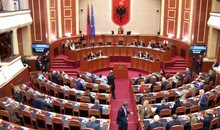

Coup in Yrshek/ Rei Nozlli, son of the Commissariat agent 2
2025-05-15 16:46:04
Elections, Lela: What has happened is threatening the fate of Albania's future
2025-05-15 16:30:48


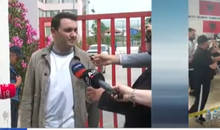

Diaspora vote, counting of envelopes for 5 districts closes
2025-05-15 15:35:35
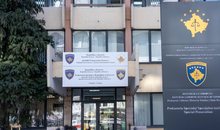
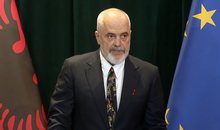
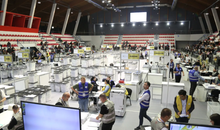
Preferential votes, 5 socialists in the race for two mandates
2025-05-15 14:47:21
Ornaldo Rakipi's observer punches the chairman of the KZAZ in Kashar
2025-05-15 14:31:02
Document/ DP asks CEC for documentation of diaspora voting process
2025-05-15 14:20:31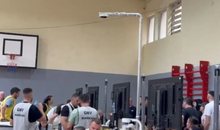

Vehicle runs off the road in Borsh, police officer dies, two others injured
2025-05-15 14:03:22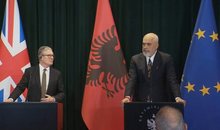

Fatal accident in Tirana, motorcycle driver crashes into curb
2025-05-15 13:38:07
4 drug traffickers extradited from Greece and Italy, here are their sentences
2025-05-15 13:29:54
SPAK seized his phone, Shkreli: Ready to cooperate
2025-05-15 13:20:11

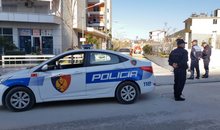
Daughter stabs father in Vlora
2025-05-15 12:54:28
Tirana DP's open list, Tabaku deepens the result against Alimehmet
2025-05-15 12:41:01
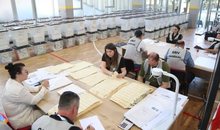

Veliaj celebrates Rama's victory, even though he was forgotten in the campaign
2025-05-15 12:10:40

Police use EU Summit, deny permission for May 16 protest
2025-05-15 11:48:47

Sara Mila, the 'strange phenomenon' of the Elbasan elections
2025-05-15 11:27:25



British Prime Minister arrives at the President's Office, welcomed by Begaj
2025-05-15 10:48:52
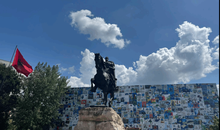
EU Summit Agenda/ Who are the leaders coming to Tirana on May 16?
2025-05-15 10:14:47
Car hits pedestrian to death in Kavaja
2025-05-15 09:53:32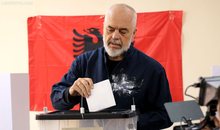
Analysis: Absolute victory of the SP, fewer votes, more mandates
2025-05-15 09:34:12
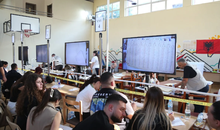
SP candidates who received the most votes but could not enter the Parliament
2025-05-15 09:07:31
The counting of diaspora votes continues, how do the political forces rank?
2025-05-15 08:51:25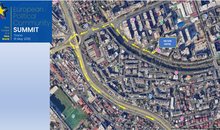
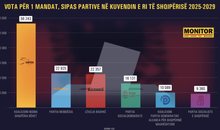
Albania votes, the formula decides
2025-05-15 08:31:23
Horoscope, what do the stars have in store for you today?
2025-05-15 08:13:48
Weather forecast/ How temperatures will vary throughout the day
2025-05-15 08:00:32
Morning Post/ In 2 lines: What mattered yesterday in Albania
2025-05-15 07:46:35

Bardhi: I have no comment on the election loss
2025-05-14 22:35:39
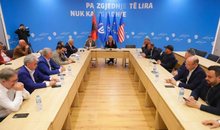
Berisha: Even the internationals admitted that the elections were a farce
2025-05-14 22:00:42
Trump expresses readiness to participate in Russia-Ukraine talks in Turkey
2025-05-14 21:43:21
Berisha: Gangs operated in 10 districts to bring 30 SP deputies to parliament!
2025-05-14 21:24:31




Balliu: This loss affects us all, we'll see where we stand.
2025-05-14 20:32:18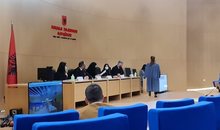

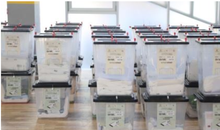

Former diplomat: EU summit, SP propaganda tool
2025-05-14 19:38:55
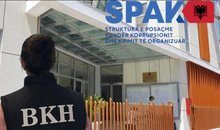

Costa in Podgorica: Montenegro could become an EU member by 2028
2025-05-14 18:46:17
Parties and candidates did not respect media freedom and transparency
2025-05-14 18:42:28

Video/ Heavy traffic at the exit of Tirana, chaos on the Tirana-Durrës highway
2025-05-14 18:09:52
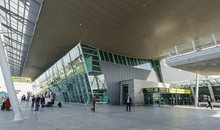
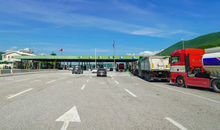
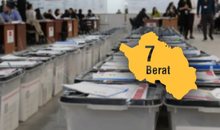

Lapaj reacts after securing 1 mandate: I will make you curse yourself
2025-05-14 17:13:30
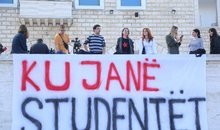
'We have the government we deserve': Students are distrustful of elections
2025-05-14 16:49:42

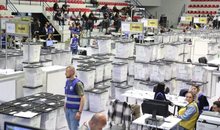



Elections in Albania, DW: Maintaining power through dubious means?
2025-05-14 15:43:10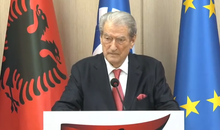

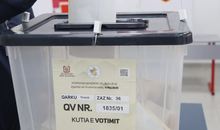
The US should not recognize the rigged elections in Albania
2025-05-14 15:18:14
Tension in CEAZ no. 31 in Tirana, vote counting suspended after clashes
2025-05-14 15:13:32

Berisha evaluates OSCE report: They have ruined the elections
2025-05-14 14:45:11
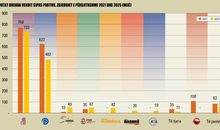

SPAK and BKH action in Shkodra, some escorted for electoral crimes
2025-05-14 14:05:26
This type of food can increase the risk of a deadly disease
2025-05-14 13:54:51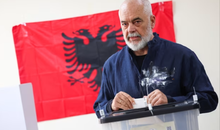


EU adopts new sanctions package against Russia
2025-05-14 13:30:51
Albanians' spending on private education reached 200 million euros in a decade
2025-05-14 13:20:22
The poorest president in the world passes away
2025-05-14 13:10:33
